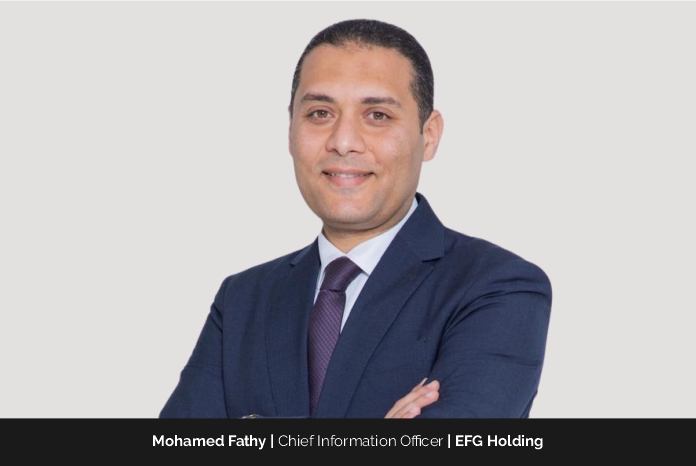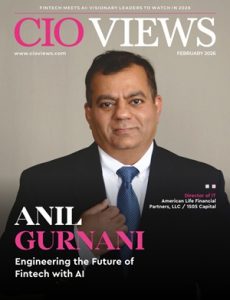As CIO, Mohamed Fathy has positioned EFG Holding as a leading tech-forward financial institution in the MENA region. He has spearheaded the company’s digital transformation, making technology the “primary engine” of its growth. He sees his role not as leading one of the region’s best IT units, but as the architect of EFG Holding’s digital future.
Mohamed was drawn to fintech because it sits at the most dynamic intersection of two powerful forces: tangible human need and transformative technology. He believes finance is the lifeblood of economies and ambitions, and technology is the great enabler. “My journey has been about closing the gap between the two,” Mohamed says. He always looks at technology through a business lens, and at EFG Holding, this perspective evolved into his current CIO role.
Mohamed’s focus is on ensuring that every technological investment they make directly fuels growth and enhances client experience, in addition to cementing the company’s position at the forefront of the region’s financial innovation.
Strategic Portfolio of Initiatives
Disruption, Mohamed says, is a strategic portfolio of initiatives that fundamentally reshapes their operational capabilities and market offerings. At EFG Holding, they have championed this through three core innovations, which are redefining the fintech landscape in their region.
EFG Hermes ONE, the first core innovation, has proved to be a game-changer in democratizing investment. This unified, mobile-first platform has disrupted the traditional brokerage model by offering retail investors one-click access to multiple MENA and global markets. Mohamed highlights that it is a first of its kind in their region. EFG Hermes ONE is promoted more as an ecosystem and less as a trading app.
According to Mohamed, they integrated fully digital eKYC onboarding, multi-asset class trading, including margin and short selling, and daily AI-powered technical analysis from their in-house experts. “This consolidation of fragmented services into a single, seamless experience has empowered a new generation of investors, fostering financial literacy and market participation like never before,” he says.
The second core innovation is the Direct Market Access (DMA) platform for institutional clients. Completely rearchitected by Mohamed and his team, it is setting a new regional precedent for speed and efficiency. “This isn’t an incremental upgrade,” Mohamed points out. “It is a technological leap.”
DMA was built on a cutting-edge stack using microservices and cloud infrastructure. Because of that, there is a dramatic reduction in latency and an exponential increase in order processing capacity. Mohamed points out that the results were transformative, driving a monumental surge in both trading turnover and order volume. DMA has fundamentally altered the landscape of institutional trading. It has allowed clients to execute complex strategies at unprecedented speeds, as well as solidified EFG Holding’s position as a leader in the capital markets.
“Our re-architected DMA platform was recognized as a regional leap forward when we partnered with Microsoft Azure, achieving a throughput of 8,000 orders per second and boosting turnover by 45%,” Mohamed informs.
Mohamed and his team have also turned their focus inward with EVA, short for Employee Virtual Assistant. With this innovation, they disrupted their own internal culture by embedding an AI-powered concierge directly into Microsoft Teams. Mohamed explains that EVA automates the mundane, from scheduling Zoom meetings and booking rooms to generating IT tickets and answering HR policy questions. It can even integrate a secure version of ChatGPT for tasks like document drafting. EVA’s features have unlocked the team’s strategic potential, freeing them from administrative tasks to focus on high-value work. “It’s a testament to how disruptive innovation isn’t just external,” Mohamed says. “It’s about leveraging technology to empower our people, boost productivity, and build a truly future-ready enterprise.”
Together, these three innovations, spanning retail client engagement, institutional trading infrastructure, and internal workforce empowerment, Mohamed says, represent a “holistic and truly disruptive digital transformation” that positions EFG Holding at the forefront of the financial technology revolution.
A Major Achievement: Cultural Shift
Under Mohamed’s leadership, EFG Holding has undergone a major cultural shift. Earlier, technology was viewed merely as a support function; it is now recognized as the primary engine of growth. “This wasn’t about launching a single platform or product,” Mohamed points out. “It was about changing how people think.” This culture shift, which he oversaw, is the achievement Mohamed is most proud of. From this experience, he realized that the most challenging aspect of leadership isn’t the technology itself, but it is guiding people through change.
“To succeed, you need to be more than a strategist,” Mohamed says. “You must also be a communicator, a coach, and a storyteller who can paint a clear picture of the future you’re trying to build.”
Additionally, Mohamed points out that attracting and developing top talent has been central to EFG Holding’s transformation journey. He also considers building a strong team as one of his proudest achievements, recognizing that no transformation is possible without the right people. “Having a team of top professionals who are motivated, capable, and trusted across the firm has been the foundation that has made every other success possible,” he says. This philosophy has guided two of the most critical transformations he led. The first was in cybersecurity.
Mohamed underscores that people remain the first and most important line of defense, though technology can stop many threats. In order to make employees active participants in defending against increasingly sophisticated attacks, from ransomware to synthetic fraud, he incorporated awareness and education into the culture to empower them. By communicating clearly and consistently, he ensured that people understood their role in protecting the firm.
The second transformation involved building Digital Factories. According to Mohamed, instead of treating IT as a back-office function, they created agile hubs where cross-functional teams, from product managers to data scientists and designers, work together to deliver digital solutions at speed. These factories break down silos, foster experimentation, and keep the customer at the center of the design process.
The challenges are real, from legacy systems to cultural resistance, but by focusing on people, collaboration, and mindset, Mohamed has turned them into engines of innovation, enabling the company to lead the market rather than follow it.
“Looking back, these experiences reinforced a simple truth: technology changes rapidly, but culture changes more slowly,” Mohamed says, “and having the right people in place is what makes leading that cultural shift possible.”
Overcoming a Major Challenge
Modernizing legacy infrastructure without business disruption is a universal challenge. Mohamed too encountered it. To overcome it, he adopted a strategic, incremental evolution method, rather than the risky “big bang” replacement. He and his team created a digital layer over existing systems by prioritizing API-based integrations. Mohamed says that this allowed them to launch new services quickly. Simultaneously, they executed a careful, phased migration of core components to the cloud.
“This dual approach enabled us to maintain 100% business continuity while systematically future-proofing our entire technology stack, transforming a potential bottleneck into a strategic advantage,” Mohamed says.
Visionary Leadership in Fintech
In fintech, visionary leadership does not mean predicting the future, according to Mohamed. He believes it is about building the right team through a thorough hiring process and creating a healthy environment for them to learn, grow, and reach their full potential. It is also about establishing the architecture that enables them to invent the right future.
In addition, for him, visionary leadership is the ability to see beyond the next quarterly report and architect a foundation resilient and agile enough for what comes next. “I embody this by operating on two horizons simultaneously,” Mohamed says. “First, by ensuring operational excellence and security today, and second, by actively building and testing the platforms of tomorrow.” He also creates a culture where, along with adopting technology, they adapt it to shape new markets and redefine what is possible for their clients.
As CIO at EFG Holding, Mohamed is responsible for developing a functional strategy that is aligned with and supports the corporate strategy. He then translates a bold vision into executable programs, making the future a tangible project plan for their teams.
Assessing Trends and Role of Data
Mohamed and his team have adopted a structured, use-case-driven approach. So, instead of chasing technological trends, they assess them against their strategic goals. “I’ve established a dedicated governance process to evaluate emerging technologies,” Mohamed points out.
He explains they run focused pilot programs with clear success metrics to understand their practical application and potential ROI. In addition to that, they maintain strategic partnerships with FinTechs, academic institutions, and technology providers. “This ecosystem provides us with a frontline view of innovation,” Mohamed says. That allows them to learn, experiment, and integrate what truly matters, as well as responsibly disregard what is merely hype.
When it comes to data, Mohamed points out that its role has evolved. “Data is no longer just about reporting the past,” he points out, “It’s about shaping the future.” At EFG Holding, their goal is to move from hindsight to foresight. So, they use data not only to understand what has happened but also to anticipate what comes next. Mohamed says that they have built a unified data architecture that gives their teams fast access to clean, relevant data, which allows them to respond to market shifts and client needs with speed and confidence.
They are also leaning heavily on AI to bring these datasets to life. “Complex information is transformed into clear, actionable insights that guide everything from delivering personalized client experiences to strengthening risk management, Mohamed explains. “This transforms data from a static resource into a strategic enabler that informs every decision we make and helps us stay ahead in a rapidly changing industry.”
In a Forbes piece he wrote, titled “A Deep Dive into Artificial Intelligence and Its Applications” (April 2024), Mohamed shared how AI-driven predictive analytics is becoming the proper foundation of competitive advantage in finance. At EFG Holding, this belief is not theoretical. Mohamed says that it is the way they operate every day.
Advice for Aspiring Tech Leaders
Mohamed sums up his advice to aspiring tech leaders in fintech in two key points. First, he advises them to keep themselves close to people who challenge them, especially those who make them feel threatened. “They will push you out of your comfort zone and force you to grow in ways that a circle of agreement never will,” he says.
Second, he underscores the importance of mastering the language of business as fluently as the language of technology. In fintech, he points out, leaders’ impact is not measured by how well they can code or design systems. What matters the most is their ability to connect technology to commercial outcomes, such as revenue, risk, efficiency, and customer trust. “That means cultivating genuine curiosity about the financial world you operate in: understanding a trader’s frustration, a banker’s workflow, or a client’s unmet need,” Mohamed says. “That is where meaningful innovation comes from, and that is how you make a lasting impact.”
The Legacy!
Mohamed does not want his legacy to be just about a single product or platform. “Those come and go,” he says. He hopes to leave behind a legacy of a culture of innovation that sustains itself. He explains that it is a way of working where the drive to create better, more innovative, and more client-focused solutions is an integral part of who they are.
At AFG Holding, he wants his impact to be measured by the people they develop and the mindset they embed, which means the teams that can carry the firm’s leadership forward long after he is gone.
“Beyond my work at EFG Holding, my ambition is to help position my country as a global hub for fintech innovation and a regional data center hub,” Mohamed says. “And just as importantly, I want to inspire a new generation of leaders to believe that with vision, courage, and execution, they can redefine the future of finance.”





